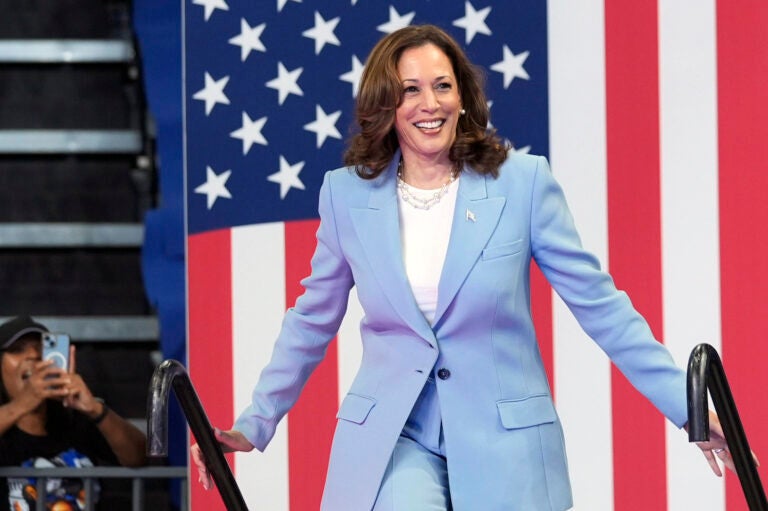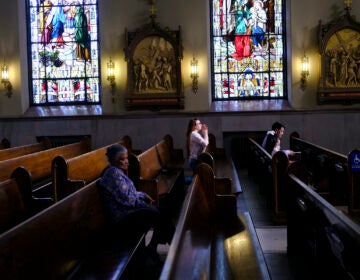Due diligence: Pa. Hispanic voters shift heavy to Harris following Biden’s exit
A new poll says that 49% of Hispanic Pennsylvanians plan to vote for Harris, a 10 percentage point jump over Biden earlier this year.
Listen 4:16
Vice President Kamala Harris arrives to speak during a campaign rally, July 30, 2024, in Atlanta. (AP Photo/John Bazemore)
What questions do you have about the 2024 elections? What major issues do you want candidates to address? Let us know.
Recent polling shows Democratic presidential nominee Kamala Harris is beating Republican nominee Donald Trump among Pennsylvania voters — a brand new poll by Quinnipiac University, for example, puts her four points ahead. That represents a significant change from when President Joe Biden was still at the top of the ticket.
However, a poll by TelevisaUnivision’s Strategy & Insights provided to WHYY News prior to its publication reveals that shift may have been particularly significant among Hispanic voters in the state. Whereas 39% of Hispanic voters in the Commonwealth said they definitely planned to vote for Biden just before his announcement, 49% now say the same about Harris.
That checks out, according to Sarina Torres, 23, of Allentown.
“I think a lot of that shift comes from Latina voters,” Torres, a college student and movement politics organizer, told WHYY News. “It’s more exciting to vote for a woman of color.”
1 million and growing
The TelevisaUnivision poll provides a rare look into voter reactions to Biden being replaced by Harris atop the Democratic ticket. The poll was already being conducted when Biden made his announcement, and researchers were able to record the immediate change in public opinion. Trump saw a marginal gain in votes in his head-to-head contest against the Democratic nominee.
Kathy Whitlock, VP of Strategy & Insights at TelevisaUnivision, warned that it’s still too early to make concrete predictions, but said the poll also gives key insights into a growing voting bloc that may impact the results in what is expected to be a close race in Pennsylvania.
“In the past, it was a virtual tie and this breathed new blood into this cycle,” she said.
There are more than 1 million Hispanic residents in Pennsylvania, according to the U.S. Census Bureau, including more than 392,000 registered voters, now 5% of the electorate. The poll projects that 318,000 of those will vote this year, an increase of nearly 70% since Donald Trump won the state in 2016 by roughly 44,000 votes. By comparison, the nation’s non-Hispanic voting population increased by less than 40%.
While 65% of Hispanics in the nation are of Mexican origin, only 16% of those in Pennsylvania are. The majority of Pennsylvanian Hispanics, 63%, are of Caribbean descent, particularly from Puerto Rico. Another 14% are South American.
With a median age of 34 years old, Hispanic voters are much younger than their median average non-Hispanic counterparts, who average 52 years old. They also make much less than non-Hispanics ($49,509 vs. $88,712), they are more likely to have children (54% vs 31%) and they are more likely to rent their homes (59% vs. 25%).
Economic issues dominate
As a result, Whitlock said, they are much more likely to focus on “pocketbook” issues, such as the cost of living, which 82% of Hispanic voters called “one of the most important,” compared to 77% of non-Hispanics. Otherwise, Hispanic voters are mostly in line with non-Hispanics in their concerns over inflation, the price of gas and the cost of housing. Around 60% of both groups also say their economic situation turned “worse” over the last year.
However, Hispanic voters were much more likely to think the Democratic Party is better at handling the issue (55%) than non-Hispanics (41%). They are also much more optimistic about their own future, with 60% saying they expect their personal situation to “get better in the next few years,” compared to 48% of non-Hispanics.
The same number of Hispanics and non-Hispanics (32%) believe abortion should mostly be banned, but a greater number (58%) said they would not vote for a political candidate whose views were at odds with theirs. Hispanic voters are more likely to complain about homelessness and crime in their own neighborhoods and more likely to believe gun control laws would reduce crime. Given their greater likelihood to have children, education is also an important issue.
A strong majority of Hispanic voters believe that there are too many undocumented immigrants crossing the border into the country (60%), that they are a drain on U.S. taxpayers (65%) and that securing the border would stop the flow of illegal drugs and sex trafficking (64%). But they are also more likely (63%) than non-Hispanics (56%) to say the country should provide a pathway to legal status for those who have not committed a serious crime.
Party and enthusiasm
Hispanic voters around the country lean left and Pennsylvania is no different, with 57% registered as Democrats, 20% as Republicans, and 23% as independent. Similarly, 42% of Hispanic voters have a favorable opinion of Harris, compared to only 22% who do of Trump.
This is even more pronounced in the race for U.S. Senate, where 60% approve of Sen. Bob Casey’s job performance, and 65% say they plan to vote for him.
However, Whitlock said that she has seen an increase in independence among Hispanic voters the past two cycles and they’re more likely to vote across party lines, suggesting the affiliation is less determinative.
“We’ve got a very young population, so a lot of them are first time voters,” she said. “They haven’t decided where they want to go, so they come in and they vote for their first time as an independent, which means they can belong to anybody.”
Among Pennsylvania’s Hispanic voters, 43% said that they would “likely” or even “very likely” vote for a candidate from a different party than they have voted for in the past.
“I have never seen crossover voters looking like this,” Whitlock said. “That shows you where that independent streak comes in, where younger voters come in. They think ‘I have a vote and I can make a difference, and I might not vote for what I voted for in the past, whether Republican or Democrats.’ So this could really go either way.”
Voter turnout
As a result, Whitlock suggests that Hispanic voters are up for grabs to the campaigns that make the effort.
“I tell everybody, get out and talk to them — whether it’s yard signs, whether it’s radio, whether it’s TV, whether it’s streaming, whether it’s going to church meetings or community meetings, get out and talk to Hispanic voters,” she said.
She adds that it’s important for candidates to talk about what they will do for them and not just assail their opponents.
“You can go negative, but you’ve got to promise a positive,” she said. “A big part of campaigning with Hispanics is providing a payoff.”
“You need to get them enthused about you,” Whitlock added.
Torres, the college student and organizer, agrees with that.
“It’s more powerful to vote for someone who carries herself with decency and we can work with than voting for Joe Biden because I don’t want Donald Trump to win,” Torres said.

Get daily updates from WHYY News!
WHYY is your source for fact-based, in-depth journalism and information. As a nonprofit organization, we rely on financial support from readers like you. Please give today.





